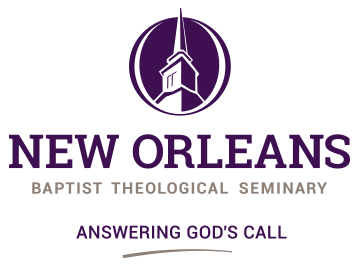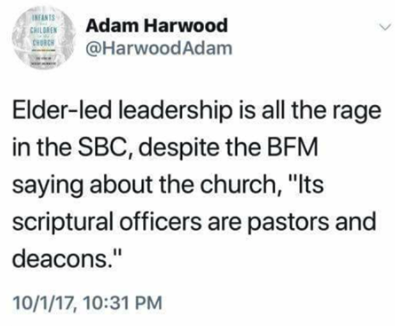Adam Harwood is Associate Professor of Theology at New Orleans Baptist Theological Seminary (SBC), Director of the Baptist Center for Theology & Ministry, and Editor of the Journal for Baptist Theology & Ministry at New Orleans Baptist Theological Seminary in New Orleans, Louisiana. Harwood made a name for himself promoting ideas best described as semi-Pelagianism and propagating pretty bold denials of Original Sin (as it has historically been understood) while serving at Emir Caner’s Truett-McConnell college. He is a graduate of Southwestern Baptist Theological Seminary and is closely associated with the anti-Calvinist Southern Baptist group, Connect 316.
Yesterday, Harwood tweeted out, “Elder-led leadership is all the rage in the SBC, despite the BFM saying about the church, Its scriptural officers are pastors and deacons.’ ”
The section of the SBC Faith and Message he refers to is from Article VI…
A New Testament church of the Lord Jesus Christ is an autonomous local congregation of baptized believers, associated by covenant in the faith and fellowship of the gospel; observing the two ordinances of Christ, governed by His laws, exercising the gifts, rights, and privileges invested in them by His Word, and seeking to extend the gospel to the ends of the earth. Each congregation operates under the Lordship of Christ through democratic processes. In such a congregation each member is responsible and accountable to Christ as Lord. Its scriptural officers are pastors and deacons. While both men and women are gifted for service in the church, the office of pastor is limited to men as qualified by Scripture.
Elder-led leadership is all the rage in Southern Baptist churches. In fact, elder-led leadership has been all the rage in Southern Baptist churches since its inception, including those churches that operate on a single-bishop model of leadership.
There has been an age-old debate regarding how many pastoral leaders a congregation should have. Proponents of both the single-bishop model and the plurality-of-elders model have argued since at least the second century. The Scripture seems to suggest (pretty frankly) that multiple elders are to serve each church body (Acts 11:30; 14:23; 15:2; 20:17, Titus 1:5, etc). All the church fathers, with one notable exception – Ignatius of Antioch – argued for a plurality of elders as opposed to the “monarchial bishop” or “single bishop” model. Early Christian writings like the Didache, 1 Clement, and the Shepherd of Hermas all indicate a plurality of elder leadership in early churches. For a good summary of the early church’s debate on the single-bishop versus multiple-elder model, click here.
Among Baptists, there has always been “elder leadership,” regardless of whether or not Baptists have leaned more towards the single-bishop model or the multiple-elder model. This is because bishops are elders. Elders are presbyters. Presbyters are overseers. Overseers are shepherds. Shepherds are pastors. In other words, the argument has never been about whether or not a church should have elder leadership (because a “pastor” is an elder, and vice versa), but whether or not there should be more than a single elder. For more information, click here.
Simply put, there is no difference – none – between a “pastor” (as spoken of in the Baptist Faith and Message) and an “elder” (or for that matter, a bishop, presbyter, shepherd or overseer). It is the office whose qualifications are given in the pastoral epistles of Timothy and Titus.
The reason why ardent anti-Calvinists seem to lean toward the single or monarchial-bishop model rather than the plurality-of-elders model is that the recent resurgence of Calvinism has come through trends popularized first in Baptist seminaries and not originating typically from within the congregation. Therefore, they prefer the balance of power (for lack of a better word) remain in the pew, rather than in the pulpit. Sometimes the ardent anti-Calvinist prefers the balance of power remain in the deacon body, a sort of unqualified defacto, unofficial elder-like body, which is also Scripturally problematic.
The point of this is that a Southern Baptist seminary professor doesn’t seem to understand that there is no difference between “pastor” and “elder.” This is disturbing and does not bode well for the quality of education at New Orleans Baptist Theological Seminary.












